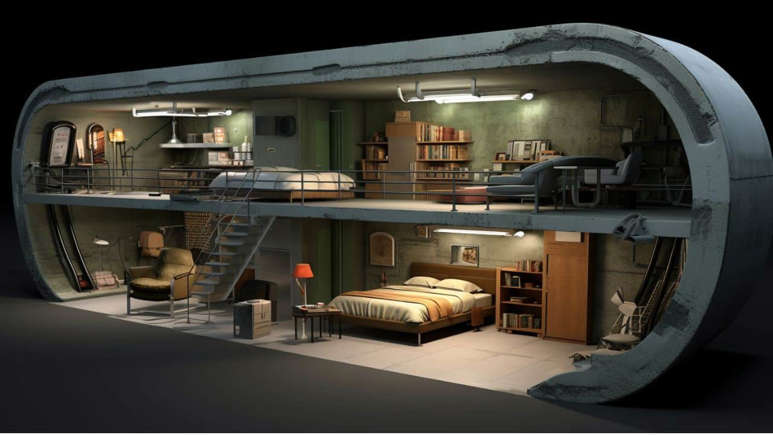New Mars Forums
You are not logged in.
- Topics: Active | Unanswered
Announcement
#76 2024-01-02 16:03:21
- Calliban
- Member
- From: Northern England, UK
- Registered: 2019-08-18
- Posts: 4,305
Re: Living inside Mountains / Caves on Mars?
That is a novel idea. Urea can be manufactured from ammonia and CO2.
2NH3 + CO2 = H2N-CO-NH2 + H2O
The reaction is endothermic, but needs high pressure to take place at a decent rate. Presumably we will be making ammonia on Mars and CO2 is everywhere. If oxygen is produced for human breathing, then waste hydrogen can be converted first to ammonia and then to urea.
Another option for building materials on Mars is natural basalt rock, which is sawn into useful shapes. If we are building underground, we will presumably be quarrying this out anyway. Using diamond wire saws, we could machine stone into any shape we want. We could also carve it using milling machines and lathes.
https://www.timbertools.com/Dario-Diamo … anite.html
Whilst industrial diamonds are expensive, the mass of cutting tools is small compared to the amount of stone they can process. So it should be economically favourable to ship them from Earth to Mars.
Last edited by Calliban (2024-01-02 16:11:03)
"Plan and prepare for every possibility, and you will never act. It is nobler to have courage as we stumble into half the things we fear than to analyse every possible obstacle and begin nothing. Great things are achieved by embracing great dangers."
Offline
Like button can go here
#77 2024-01-02 21:15:31
- RobertDyck
- Moderator
- From: Winnipeg, Canada
- Registered: 2002-08-20
- Posts: 8,394
- Website
Re: Living inside Mountains / Caves on Mars?
Many years ago, I posted how to make ammonium nitrate fertilizer. That's white granules, just normal nitrogen fertilizer. Was used on farms for decades, used to be used on lawns. It's made from nitrogen, water, electricity, and some equipment you can build from stuff you can get from a hardware store. After the Oklahoma bombing, government required a license to buy it, so I don't post that any more. Let's just say you can make it. And yes, one step is to make ammonia.
Offline
Like button can go here
#78 2024-01-03 18:49:44
- SpaceNut
- Administrator
- From: New Hampshire
- Registered: 2004-07-22
- Posts: 30,613
Re: Living inside Mountains / Caves on Mars?
I agree since searches for this would be part of a topic watch consideration.
Offline
Like button can go here
#79 2024-02-12 08:09:40
- Mars_B4_Moon
- Member
- Registered: 2006-03-23
- Posts: 9,776
Re: Living inside Mountains / Caves on Mars?
One disadvantage of being inside a 'Cave' is it can be like a difficult outpost, stress due to broken day night rhythms or the South Pole where psychological issues are well documented, a draw back is you are increasing stress due to lack immobility, monotony, a new harsh physical environment, lack of intimate contact, sexual deprivation, lack of human interaction, missing the input from new visual stimulation, new sounds and the general isolation.
Mental health, physical symptoms and biomarkers of stress during prolonged exposure to Antarctica's extreme environment
https://www.sciencedirect.com/science/a … 652100062X
“You sound so down” – how AI technology developed in Antarctica can help diagnose depression
https://semmelweis.hu/english/2023/03/y … epression/
A lack of sunlight may cause winter-onset SAD (Seasonal Affective Disorder)
Effect of sunlight exposure on cognitive function among depressed and non-depressed participants: a REGARDS cross-sectional study
https://www.ncbi.nlm.nih.gov/pmc/articles/PMC2728098/
Perhaps Robot Doctors can give Assessment of Mental Health in Expeditionary crew, AI software artificial people who give services in Mars, Titan, Europa etc
another topic
Good Health in Transit to and From Mars
https://newmars.com/forums/viewtopic.php?id=9672
Offline
Like button can go here
#80 2024-02-12 08:26:10
- tahanson43206
- Moderator
- Registered: 2018-04-27
- Posts: 24,123
Re: Living inside Mountains / Caves on Mars?
For Mars_B4_Moon .... re #79
Thank you for this important contribution to the topic ....
While #79 comes across to me as showing the downside risks of life in extreme environments, it appears that some organizations have learned how to achieve success. I'm thinking in particular of submarines which are mobile "caves" without sunlight, where personnel spend months at a time. The military seems to have found ways to make such a life tolerable, or perhaps even attractive for carefully selected persons.
A possible technique that might be worth considering, is to generate a bath of visible light that is a near match to our familiar Sun's radiation.
Please keep an watch for any articles that may exist, reporting on experiments with simulated sun light to improve morale in situations where natural sunlight is not available.
This forum contains at least one article about successful adaptation to life without sunlight in polar regions.
(th)
Offline
Like button can go here
#81 2024-02-16 20:35:30
- SpaceNut
- Administrator
- From: New Hampshire
- Registered: 2004-07-22
- Posts: 30,613
Re: Living inside Mountains / Caves on Mars?
Offline
Like button can go here
#82 2024-03-02 12:23:20
- Mars_B4_Moon
- Member
- Registered: 2006-03-23
- Posts: 9,776
Re: Living inside Mountains / Caves on Mars?
Troglofauna, Troglophiles, Troglobites, Animal echolocation or animals with bio sonar, Trogloxenes live sporadically in an underground habitat and unable to establish a subterranean population. Typical adaptations found in cavefish are reduced eyes and pigmentation, cave animals include turbellarians, gastropods, decapods, fishes, or salamanders. Stygofauna feed on plankton, bacteria, and plants found in streams
Cave Lifeforms
https://www.youtube.com/watch?v=KjPGKZp4JwM
CAVES 2011 mission accomplished: cave crew astronauts return to Earth
https://www.youtube.com/watch?v=8T8-Csf4ThM
ESA astronauts Tim Peake and Thomas Pesquet, Randolph Bresnik from NASA, Norishige Kanai from Japan and Sergey Ryzhikov from Russia went down to partly unexplored caves in Sardinia on 17 September 2011. They lived and worked in the dark and humid underground environment for six days on ESA's CAVES 'mission'.
The cave-a-naut in the extreme environment training of the European Space Agency's Cooperative Adventure for Valuing and Exercising human behavior and performance Skills (CAVES), in Sardina, Italy
a surge in NYC crimes
NYC subway violence surge came after police patrols plummeted to levels not seen since de Blasio administration
https://uk.news.yahoo.com/nyc-subway-vi … 44018.html
FBI raids Bronx homes of Mayor Eric Adams top aide Winnie Greco
https://news.yahoo.com/fbi-raids-home-e … 11950.html
— the third federal investigation linked to NYC mayor
Cebu City, a highly urbanized city, the capital of the Cebu Province and a population of 964,169 people main domestic shipping port and is home to about 80% of the country's domestic shipping, Cebu City is the prime trading center of the southern Philippines.
67.5-km subway system proposed for Cebu
https://www.sunstar.com.ph/cebu/675-km- … d-for-cebu
Thai cave rescue victims now - from professional football careers to tragedy
https://www.mirror.co.uk/tv/tv-news/tha … w-32195337
Last edited by Mars_B4_Moon (2024-03-02 13:33:28)
Offline
Like button can go here
#83 2024-03-06 09:16:34
- Calliban
- Member
- From: Northern England, UK
- Registered: 2019-08-18
- Posts: 4,305
Re: Living inside Mountains / Caves on Mars?
Erebor wallpaper.
https://wallpapersafari.com/erebor-wallpaper/
Some images of the two underground cities that feature in The Hobbit. Whilst this is complete fantasy, I wonder if we could build underground cities like this on Mars? I especially like the Elvish great hall, images 22 and 42, with its Gaudiesk tree-like supporting columns.
We would probably build this under a dome, rather than actually carve it out of a mountain. The dome itself would be a cast iron or cast basalt geodesic. The structure would be covered with sand bags and then a thick layer of regolith, to counteract internal air pressure. The inside surface of the dome would then be plastered, to provide a smooth, impermeable finish. The internal structure could then be made from cut stone and adobe bricks.
https://mcdn.wallpapersafari.com/medium … BTmvyl.jpg
https://mcdn.wallpapersafari.com/medium … Q296DK.jpg
By tapering outward the compacted regolith covering the dome, the compressive stress in the regolith can be kept constant, allowing it to support its own weight and the weight of the sand bags.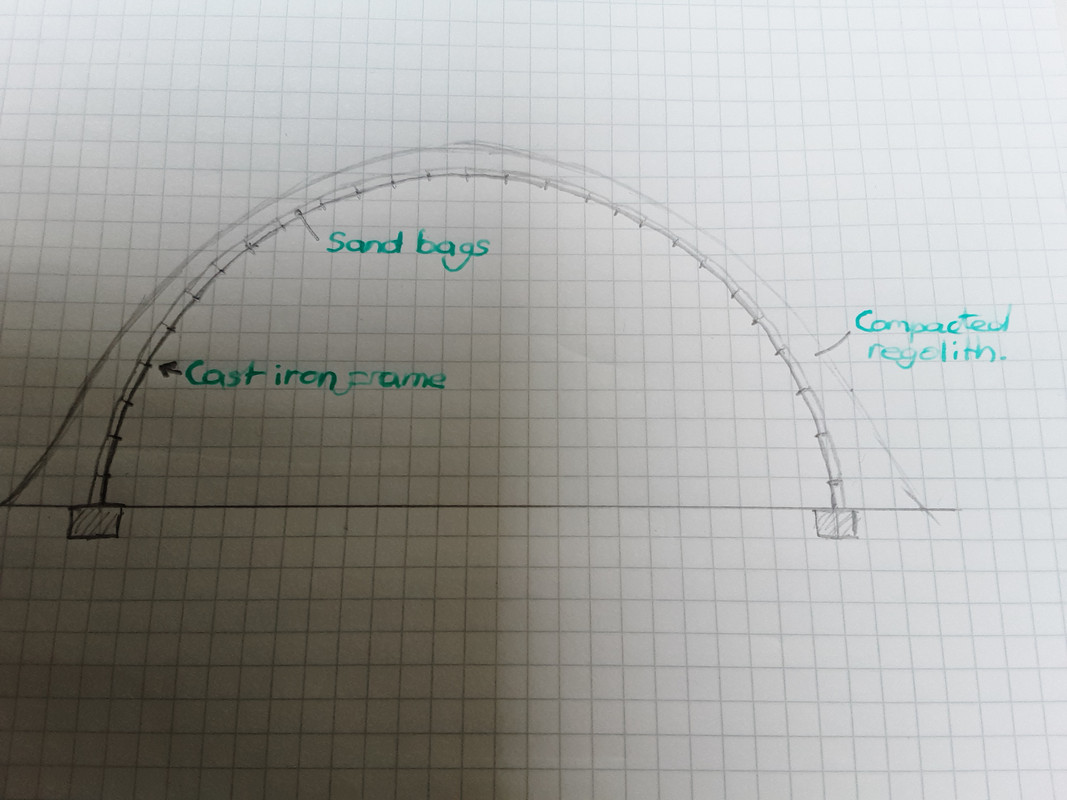
The cast iron dome only needs to support its own weight. The compressive strength of grey cast iron is 570 - 1290MPa. Its density is 7500kg/m3.
https://www.makeitfrom.com/material-pro … Cast-Iron/
Running these numbers under Martian gravity gives a maximum possible radius for a cast iron dome of 17,902m. This indicates that we could build domes of almost arbitrary size on the surface of Mars, provided that they remain compressive rather than tensile structures. A 1km diameter dome would have 261,800,000m3 of habitable volume. If this was decked, with 5m between decks, total floor space would be 52.36km2. That is enough for a sizable city. Maybe using cast basalt or shaped stone building blocks, we could fashion the sort of spacioys stone halls like tbe images shown above.
Building volumetric cities of this size starts to present problems for waste heat disposal. This is where it helps to be located on a planet with substantial ice reserves. The ice filled craters of Mars could function as ice covered cooling ponds, with liquid water pumped through the city to remove heat. The resulting lake coukd serve three functions simultaneously. It will remove heat from the city, keeping it cool. Algae in the lake will generate oxygen, which will serve the respiratory needs of the city. Finally, any fish introduced to the lake couod provide a food source.
Last edited by Calliban (2024-03-06 10:35:26)
"Plan and prepare for every possibility, and you will never act. It is nobler to have courage as we stumble into half the things we fear than to analyse every possible obstacle and begin nothing. Great things are achieved by embracing great dangers."
Offline
Like button can go here
#84 2024-05-17 14:38:39
- Mars_B4_Moon
- Member
- Registered: 2006-03-23
- Posts: 9,776
Re: Living inside Mountains / Caves on Mars?
perhaps relevant to Mars
NASA JPL Proposes Robotic Maglev Train for the Moon
Offline
Like button can go here
#85 2024-05-19 15:10:57
- Calliban
- Member
- From: Northern England, UK
- Registered: 2019-08-18
- Posts: 4,305
Re: Living inside Mountains / Caves on Mars?
Building an underground city on Mars.
https://m.youtube.com/watch?v=sDlFGRuK8B0
Impressive. But I think there are more incremental approaches that might work better. If we build habitats by carving into solid rock, then room and pillar mining can create excavated volumes that can be sealed incrementally, allowing mining to continue as people move into the excavated volume.
Another option that I have toyed with is building geodesic dome using a frame, made from cast iron repeatable units or maybe even cast basalt. We then cover it with graded layers of regolith. First with large rocks that are big enough to span gaps. Then regolith fines that pack on top of the large rocks forming an air tight layer. Then the remaining regolith to a depth of several metres.
Using a geodesic dome allow just a few repeatable units to be cast from iron or basalt and then bolted together using robots. We would probably built up the covering regolith as the frame was being assembled, so the robots and their human handlers have a surface that they can climb up as assembly proceeds.
Last edited by Calliban (2024-05-19 15:14:02)
"Plan and prepare for every possibility, and you will never act. It is nobler to have courage as we stumble into half the things we fear than to analyse every possible obstacle and begin nothing. Great things are achieved by embracing great dangers."
Offline
Like button can go here
#86 2024-05-20 12:23:11
- SpaceNut
- Administrator
- From: New Hampshire
- Registered: 2004-07-22
- Posts: 30,613
Re: Living inside Mountains / Caves on Mars?
Australia's Underground Town a Model for Future Habitation in Changing Climates
Sounds like we can learn from this for mars cities to make use of from the start.
Offline
Like button can go here
#87 2024-05-27 11:54:34
- Mars_B4_Moon
- Member
- Registered: 2006-03-23
- Posts: 9,776
Re: Living inside Mountains / Caves on Mars?
The pit cave, shaft cave, vertical cave or silo shape and pothole
Doomsday Do-Over: Revamped Former Missile Complex in Nebraska Targets the Market for $750K
https://www.realtor.com/news/unique-hom … -for-750k/
A cinema, a pool, a bar: inside the post-apocalyptic underground future
https://www.theguardian.com/cities/2019 … und-future
A missile silo converted into a 15-storey luxury subterranean apartment complex could be a taste of what lies in store in cities around the world
A Canadian Architecture social media channel 'DamiLee'
Can we REALLY build on Mars?
https://www.youtube.com/watch?v=N3KxgUxPhqI
and
https://www.instagram.com/damileearch/
and
https://www.tiktok.com/@damileearch
'Are we ready to LIVE in a NUCLEAR SILO?'
https://www.youtube.com/watch?v=JlWCIY6gNIw
Offline
Like button can go here
#88 2024-12-11 16:00:35
- Calliban
- Member
- From: Northern England, UK
- Registered: 2019-08-18
- Posts: 4,305
Re: Living inside Mountains / Caves on Mars?
I rewatched the first episode of StarTrek Voyager last night. The images of the Ocampa underground city were inspiring. The low gravity of Mars should make it possible to build similar expansive cityscapes underground.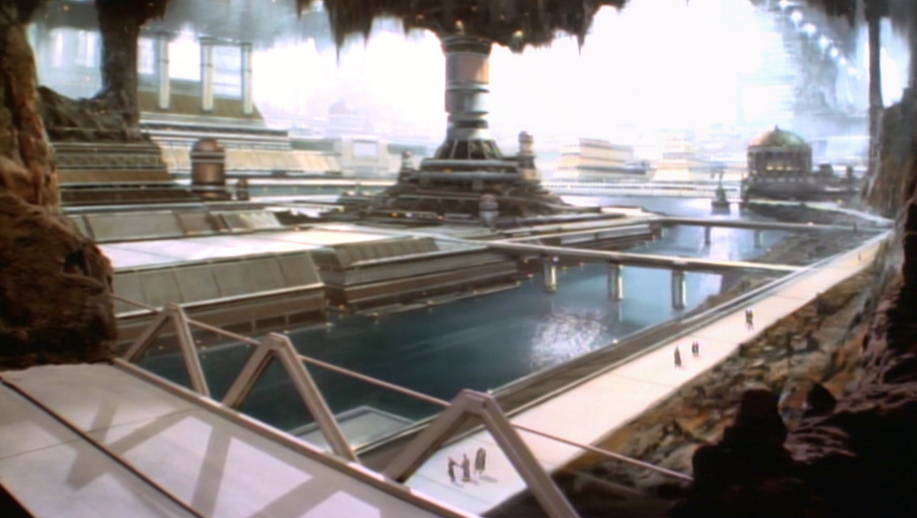
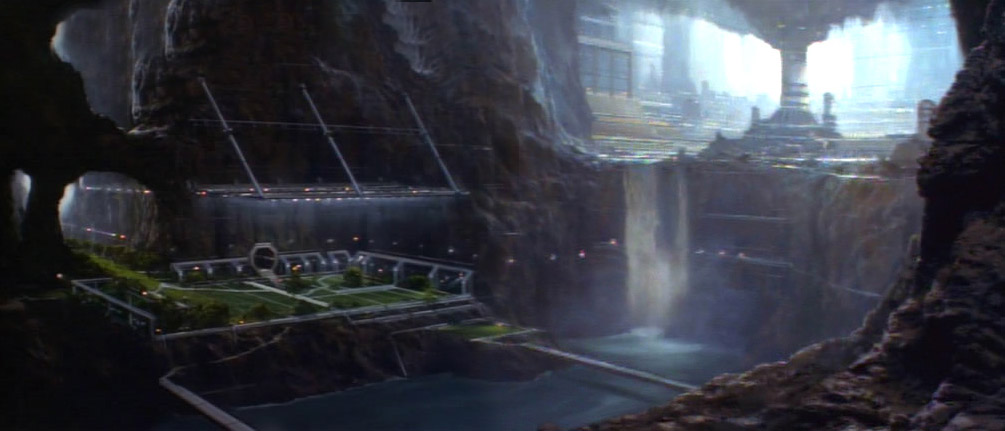
Taken from: https://memory-alpha.fandom.com/wiki/Ocampa_(planet)
On Mars, we could build large underground spaces like this by covering a crater with an arched frame mounted on vertical supporting stone and mortar pillars. At it simplest we could form hexagonal dome cells by spanning the gaps between pillars by steel I-beams. Concrete would then be cast over the whole structure, forming a thin reinforced concrete shell. The whole structure would then be covered with several metres of regolith and then pressurised. Large expanses of the Martian surface could be enclosed and pressurised in this way. We would cover the inner concrete roof with thin sheeting containing LEDs. These would simulate a blue sky. So people would not have to look at a concrete roof every time they go out into the city.
I particularly like this piece of art. Not sure who the author is.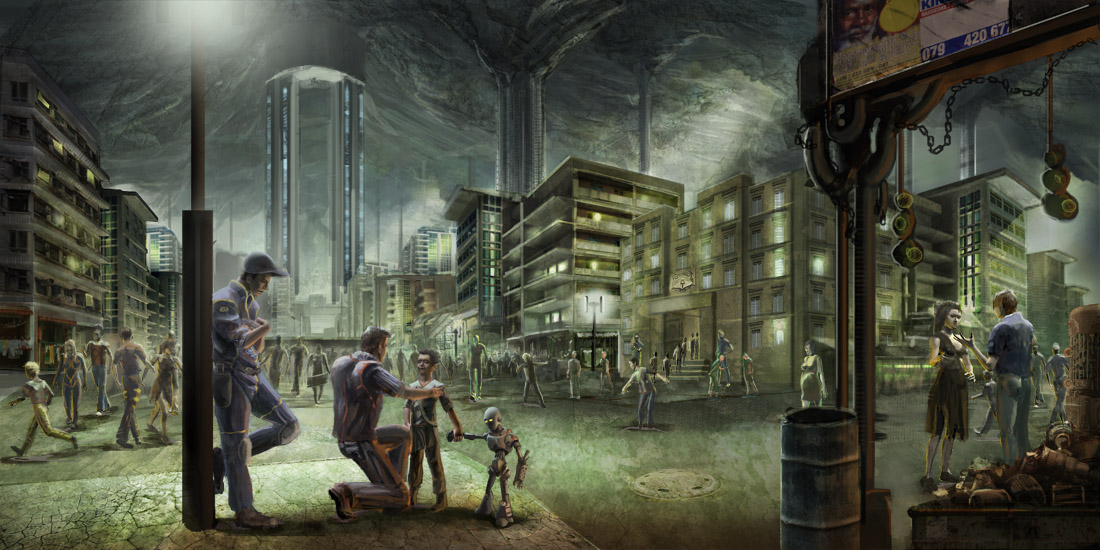
This guy has collected loads of stock photos of underground cities. Most are fantastical. But it does fire the imagination as to what we can build on Mars.
https://ar.inspiredpencil.com/pictures- … es-fantasy
Last edited by Calliban (2024-12-11 16:41:39)
"Plan and prepare for every possibility, and you will never act. It is nobler to have courage as we stumble into half the things we fear than to analyse every possible obstacle and begin nothing. Great things are achieved by embracing great dangers."
Offline
Like button can go here
